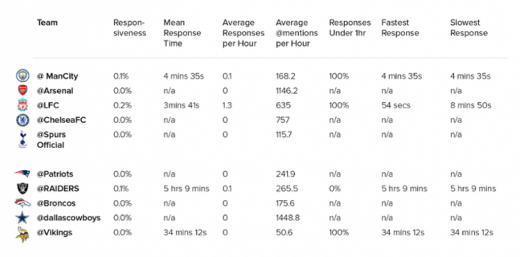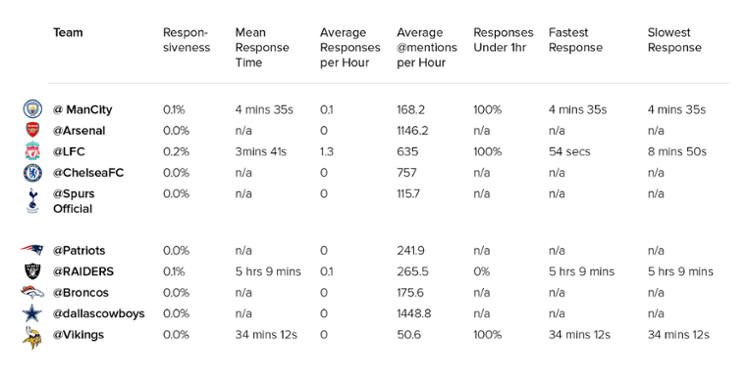Does Social Care Even Matter for Global Sports Brands?
— November 4, 2016
I’m a Brit. But I’ve lived in America for three years. This means I’ve been lucky enough to immerse myself in both cultures, benefiting from the best of both worlds (to my British friends not all Americans have perfect teeth and to my American friends not all Brits know the Queen!).
This does not mean that relocating your life from London to NYC brings both opportunities and challenges – especially being distant from friends and family. One thing that made the initial transition easy, apart from the very similar language, was my cross-Atlantic love of sports. Although English Football (known to my Yank friends as soccer) will always be Football to me, my love of American Football helped me acclimatize and not stick out like a sore thumb at bars.
But this got me thinking. Does social care, something I’m obviously passionate about, actually matter for sports teams? Is Football, or ‘Football’, more social? Which one is truly bigger and better at customer engagement over Twitter (public) channels?
To find out I used the custom built Conversocial Twitter Tracker to analyze the engagement of brand handles for the top 5 teams (in league standings as of October 28th).
Whilst doing this it’s important to remember:
- Sports teams are brands, meaning that they’re conscious of their reputation and how it impacts revenue and the bottom line.
- The top consumer generated revenue sources for sports teams are ticket sales, merchandizing and TV rights.
- With such high volumes of social chatter, teams must carefully decide which posts, comments and tweets are worthy of a reply.
Results:

How are these figures calculated?
*We used the Twitter Search API to find mentions (up to 2001 max) of each Twitter handle in October 31st 2016. We then gathered and matched the replies to those mentions and calculated the time taken in each case, excluding the slowest 5% of tweets (which can otherwise disproportionately affect results).
So to answer one of my initial questions of which Football is more social, the answer is neither. Both codes do little-to-NO engagement over Twitter. The only real difference was in the number of direct @ mentions, with UK Football teams getting 639.7 more over the time period analyzed. To put bluntly it’s obvious that Twitter, and social media more broadly, is treated as a marketing tool only. The brands/sports teams analyzed take social seriously as a marketing tool, which is very logical considering that sports teams create significant revenue from the the retail / e-commerce side of their business, but not as a Social Care channel.
But social goes further than just marketing. It’s a two-way customer-to-brand communication tool. It should not just be seen as a one-to many marketing megaphone. But this can be daunting, what happens when you open the flood gates on social and start responding? For sports teams this is even more concerning considering how passionate supporters can be. But sports teams are missing an opportunity. The sports industry by nature is a two way conversation and a sports fan naturally loves good banter and back and forth. Sports teams should be looking to encourage their community of loyal fans to communicate. Taking the conversations that happen in pubs, to a public forum for the new age customer.
Below are a few tips for companies that fear opening the social floodgates.
– Prioritize customer service issues: Make sure you can easily identify customer service content so it gets handled immediately. Companies don’t want to miss a service related tweet, and by prioritizing customer service content you can make sure that important tweets get handled faster.
– Triage and assign incoming messages automatically: Most companies have different teams inside of their overall customer service team, having content auto-tagged and auto-assigned to the appropriate agent ensures quicker, more effective responses.
– Rules to block out haters: Fans can get pretty angry when their team loses. Therefore rules that autoarchive conversations that contain profanity will result in your agents being able to manage volume, and get to the conversations that are service related.
I admit, it’s not business critical for sports teams to engage with fans over social. They already have a loyal base that will be near rain or shine. But with an the influx of people purchasing merchandise, as we enter a busy holiday/Christmas season, teams/brands need to be able to deal with the high volumes of social noise and chatter. Sifting through the noise to find opportunities to engage can often lead to a sale.
For best practices on how to deliver exceptional and ROI positive social customer care, read our recently published Definitive Guide to Social, Mobile Customer Service.
Digital & Social Articles on Business 2 Community
(13)














